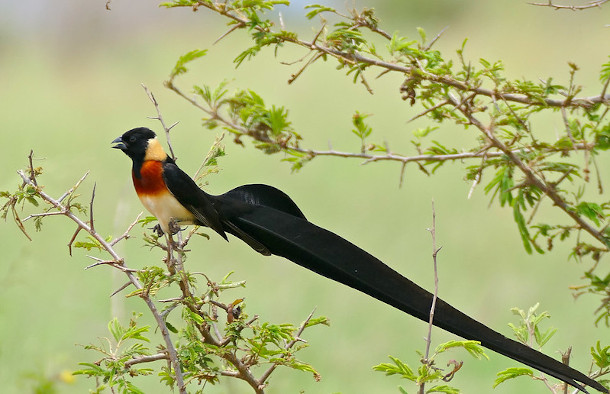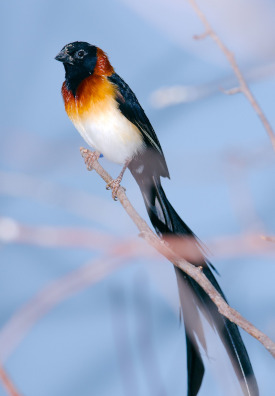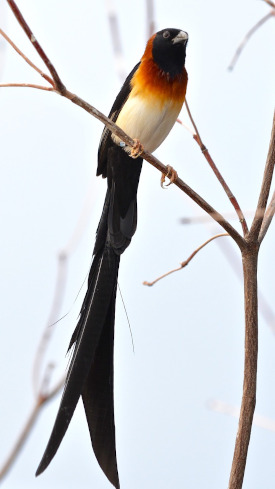BirdNote®: The Paradise-Whydah
Air Date: Week of July 10, 2020

The exact reasons for intricate breeding displays like that of the male Eastern Paradise Whydah are still up for debate within the scientific community. But whatever the reason, this Whydah catches eyes with his long trailing tail feathers. (Photo: Bernard Dupont, CC).
BIRDNOTE®: THE PARADISE-WHYDAH: Imagine if you had to grow your own evening gown just to attend a party. That's essentially what males of the East-African songbird species the Paradise-Whydah do every breeding season. These little finches sprout incredible tail feathers, many times the length of their bodies, all so the females of the species get to pick who wore it best. BirdNote®’s Mary McCann has the scoop.
Transcript
CURWOOD: We stay with African birds with this Birdnote from Mary McCann.
BirdNote®
Paradise-Whydah
[Paradise-Whydah song, https://macaulaylibrary.org/asset/28128281#_ga=2.130237135.1927678623.15..., 0.22-.28] A few times each year, the Eastern Paradise-Whydah puts on its party clothes. This small finch, found in East Africa, is just five inches long, with a black tail, brown back, and patterned face markings. But when it’s time to mate, the male molts into breeding plumage. His head turns glossy black, his neck golden yellow, and breast a vivid orange.

Not every male Paradise-Whydah is “Mr. Right”. (Photo: Josh More, CC)
But the best part? He sprouts extravagant, long, black tail feathers two or three times the length of his body. [Paradise-Whydah song, https://macaulaylibrary.org/asset/28128281#_ga=2.130237135.1927678623.15..., 0.22-.28] The male Paradise-Whydah’s tail feathers are not just super long but also broad, as if they belonged to a much bigger bird. It almost looks like the bird is wearing a long black cape. That’s how it got its nickname, “the widow bird” -- because it looks like a widowed woman in black mourning clothes. [Paradise-Whydah song, https://macaulaylibrary.org/asset/28128281#_ga=2.130237135.1927678623.15..., 0.22-.28] It’s a competitive scene during breeding season, with lots of long-tailed males chasing one another. [Eastern Paradise-Whydah call, https://macaulaylibrary.org/asset/28128281#_ga=2.130237135.1927678623.15... , 0.32-.33]

Ahh, much better! (Photo: R. A. Killmer, CC)
The more a male gets chased, the more likely he is to grow a slightly shorter tail, which could make it harder for him to stand out for the ladies.
So just remember: never underestimate the power of a good party outfit.
###
Written by Bob Sundstrom
Producer: John Kessler
Executive Producer: Sallie Bodie
Editor: Ashley Ahearn
Associate Producer: Ellen Blackstone
Producer: Mark Bramhill
Bird sounds provided by The Macaulay Library of Natural Sounds at the Cornell Lab of Ornithology, Ithaca, New York. ML 28128281 recorded by Andrew Spencer
BirdNote’s theme was composed and played by Nancy Rumbel and John Kessler.
© 2020 BirdNote June 2020 Narrator: Mary McCann
ID# EPWH-01-2020-06-16 EPWH-01
Whydah is pronounced WHY-duh
about chasing males http://southafrica.co.za/long-tailed-paradise-whydah.html
https://www.hbw.com/species/green-winged-pytilia-pytilia-melba
https://www.beautyofbirds.com/paradisewhydahfinches.html
https://www.birdnote.org/show/paradise-whydah
CURWOOD: For pictures, head to the living on earth website LOE.org and stay tuned for a brief lesson in speaking chimpanzee with Jane Goodall.
Links
Click here to learn more about this story on the BirdNote website
Pittsburgh Post-Gazette | “Let’s talk about birds: Paradise-Whydah”
Living on Earth wants to hear from you!
Living on Earth
62 Calef Highway, Suite 212
Lee, NH 03861
Telephone: 617-287-4121
E-mail: comments@loe.org
Newsletter [Click here]
Donate to Living on Earth!
Living on Earth is an independent media program and relies entirely on contributions from listeners and institutions supporting public service. Please donate now to preserve an independent environmental voice.
NewsletterLiving on Earth offers a weekly delivery of the show's rundown to your mailbox. Sign up for our newsletter today!
 Sailors For The Sea: Be the change you want to sea.
Sailors For The Sea: Be the change you want to sea.
 The Grantham Foundation for the Protection of the Environment: Committed to protecting and improving the health of the global environment.
The Grantham Foundation for the Protection of the Environment: Committed to protecting and improving the health of the global environment.
 Contribute to Living on Earth and receive, as our gift to you, an archival print of one of Mark Seth Lender's extraordinary wildlife photographs. Follow the link to see Mark's current collection of photographs.
Contribute to Living on Earth and receive, as our gift to you, an archival print of one of Mark Seth Lender's extraordinary wildlife photographs. Follow the link to see Mark's current collection of photographs.
 Buy a signed copy of Mark Seth Lender's book Smeagull the Seagull & support Living on Earth
Buy a signed copy of Mark Seth Lender's book Smeagull the Seagull & support Living on Earth

